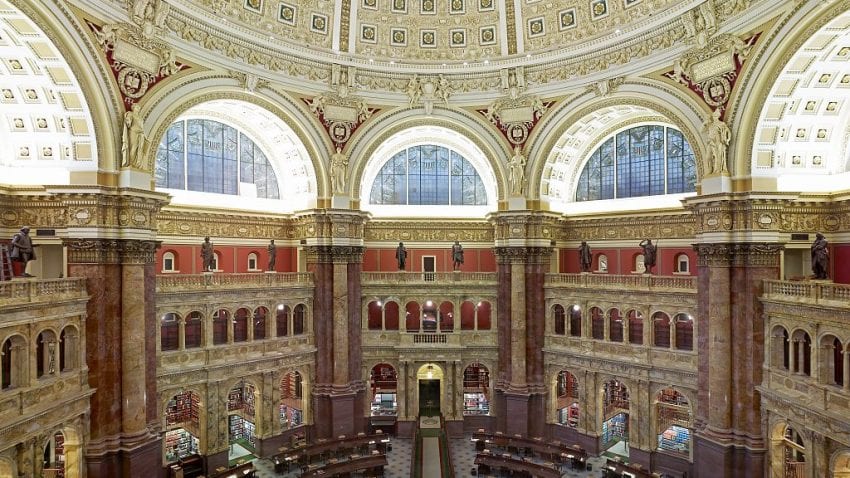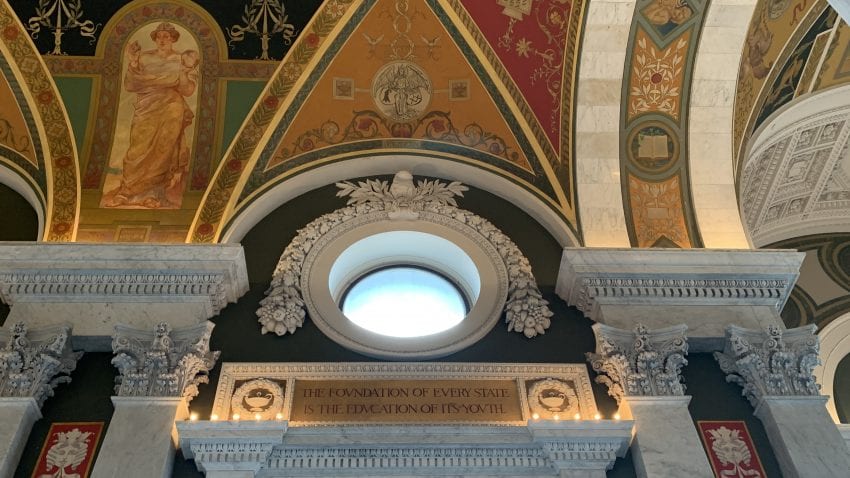My parents were both English majors in college. They were the youngest people by 30 years on my local Friends of the Library board my entire childhood and they correct my grammar every chance they get. The day that my brother was born, my father volunteered at the library book sale. Put this all together and, naturally, I’ve grown up with a love of libraries. While I’m overwhelmed by seemingly everything and my mind is in a constant state of racing, there’s something about being surrounded by books and seemingly infinite knowledge that calms me in a way that does not really make sense. Pair this with my affinity for National Treasure 2: Book of Secrets, and the Library of Congress is — naturally — my dream destination. Throughout our time in Washington D.C., I’ve visited the Library on Congress a few times and our course has had the opportunity to hold classes in a room that overlooks the main reading room. It does not quite seem real.

About how the main reading room looked from the balcony behind our classroom.
When I was a kid, my love of libraries was not all that deep. I would go to events put on in the children’s section or tag along with my parents when they volunteered and have the old women working sneak me the volunteer stash of cookies and off brand soda. The good ol’ days. As I’ve grown older though, my love of libraries has become a lot more nuanced. As I see it, libraries are one of the last public spaces that are not after people’s wallets the second they walk through the door. The phrase “libraries save democracy” is an ideal I find true, but I wish it was more so. In some ways, the Library of Congress lives up to this expectation more than any other — created to directly assist Congress, it really is on the forefront of the democratic process.
That being said, the American institution is hardly accessible to everyday citizens. In order to get into the main reading room (the only place with open shelves that is open to the public) you must first get a readers card. While that in itself makes sense, the fact that you need an ID to get one does not. About three million Americans of voting age don’t have a government issued ID, which shuts them out from so many “public” spaces. I draw a lot of parallels between this and voter ID laws — policies masked as a safeguard to keep establishments from harm but in reality they just act as a way of keeping certain groups out.
In my mind, the most important part of an effective democracy is an informed American electorate, which I think is more along the lines of what people are normally saying when they make the argument that libraries save democracy.
Anyway, let me take a brief step off of my soapbox to talk about some positives of somewhere that is truly one of my highlights of the trip. Outside of our time looking at parts of the rare book collection, or just discussing as a class, I spent a fair amount of time exploring the library and the exhibits it held. Where I probably spent the most time during my visit was walking around the main room of the Jefferson Building. It’s a hauntingly large room made of marble with intricate ornamentation all around. My focus was largely on the phrases scribed above each window; they all had something to do with knowledge and its place. It’s interesting to see how a library with literally every book views the role of knowledge in a nation. It’s even more interesting to see that many of them talked about God’s place in that.

Photo by Blake Ormond
Right off of this room is the entrance to the special exhibitions being displayed. The first one that I entered was “Shall Not Be Denied” and is about the women’s suffrage movement leading up to the 19th amendment, as well as looking at political milestones by women since. Probably two minutes after entering the exhibit, I choked up. It’s not because I was really learning anything new, but just because of how much I take for granted. The fact that we’re still at a place in this nation where “the first woman” blank is heard all the time is not lost on me even for a second, but the idea that so many powerful, dedicated women have come before and fought with every ounce of their being to get to where we are now is something that I don’t think about enough.
Okay, back up on my soapbox for one second. I think that it’s vital when looking at the history of voting rights in this country that the 19th amendment did not give all women the right to vote; that is a simplified and whitewashed version of history. There have been and remain to be people who work actively to suppress the votes of those who they see as a threat to their beliefs or as less worthy. So, while I do believe that libraries save democracy, I believe that the most well-known library in the world falls short in this respect.
Reference:
Martin, Michel. “Why Millions of Americans Have No Government ID.” NPR, NPR, 1 Feb. 2012.
